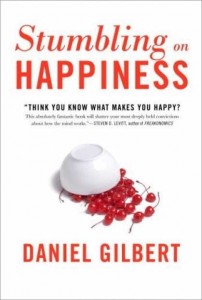By Daniel Gilbert. 2006
What is the conceptual tie that binds anxiety and planning? Both, of course, are intimately connected to thinking about the future. We feel anxiety when we anticipate that something bad will happen, and we plan by imagining how our actions will unfold over time. Planning requires that we peer into our futures and anxiety is one of the reactions we may have when we do.
The fact is that human beings come into the world with a passion for control, they go out of the world the same way, and research suggests that if they lose their ability to control things at any point between their entrance and their exit, they become unhappy, helpless, hopeless, and depressed. And occasionally dead.
People want to be happy, and all the other things they want are typically meant to be the means to that end.
[Me: This implies that happiness is an end state, rather than a transitional state between want and fulfillment, which in my view, seems more likely. In other words, happiness is in the doing, not in the getting.]
By paying careful attention to the absence of an event, Sherlock Holmes further distinguished himself from the rest of humankind. As we are about to see, when the rest of humankind imagines the future, it rarely notices what imagination has missed—and the missing pieces are much more important than we realize.
…the general inability to think about absences is a potent source of error in everyday life.
Because it is so much easier for me to remember the past than to generate new possibilities, I will tend to compare the present with the past even when I ought to be comparing it with the possible.
The only thing more difficult than finding a needle in a haystack is finding a needle in a needlestack.

